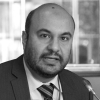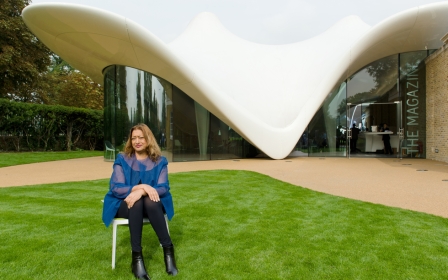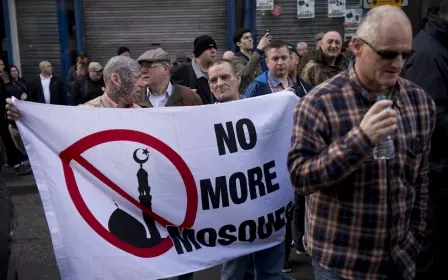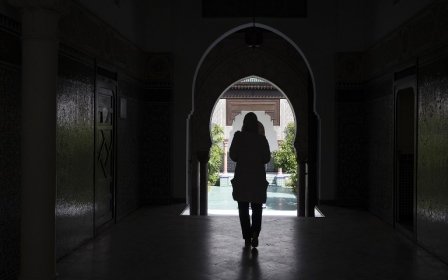A glass ceiling has descended across Europe - and it's fallen on Muslims
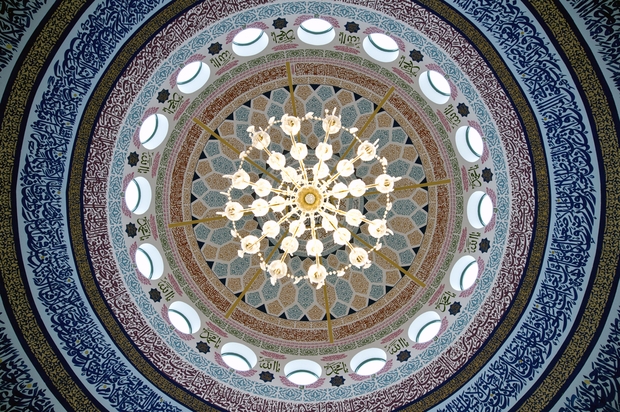
Yasri Khan was a Swedish Green Party politician who resigned in April after a media storm over his decision not to shake the hands of a female journalist. Khan, who was general secretary of the organisation Swedish Muslims for Peace and Justice, was criticised by members of his own party and later resigned, saying he was a victim of racism and Islamophobia. Only days before, Sweden's minister for housing and IT, Mehmet Kaplan, was accused of being close to Turkish nationalist organisations and compelled to quit his post.
These two examples, and there are many others, are indicative of an atmosphere of hostility and suspicion confronting the new generation of European Muslims entering public life.
A glass ceiling symbolises those barriers that at first glance are not visible, but in reality obstruct the advance of specific social segments into higher echelons or elites. This is a phrase that Europe’s Muslims would do well to remember, as it may help them describe a stark reality facing the new generation.
Scandinavia offers a suitable case study, where pressure from political and media quarters compelled young Swedish Muslims to exit the political scene. While individual stories and experiences are unique, the conclusion was the same. For these politicians and their aspiring peers - examples of Muslims reconciled with their religion - the path was simply blocked. They were driven to resign, one after the other, as a result of hostile campaigns and pressures that did not seem to lack justification.
Such cases have been recurring in other European countries for several years, but not Sweden. The country had come to prominence over recent decades as a promising model for the integration and participation of new constituents in an increasingly diverse society. Yet, from this point onward, young Muslims keen to play a part in Swedish political life will find it hard to convince their local Muslim communities, particularly the younger generation, of the good prospects in pursuing a political career, and serve the country and society, through the democratic institutions of parliament, government, or local councils.
North and south
If this is the situation in northern Europe, then what of the south? Taking Italy as an example, we have Sumaya Abdel Qader, a woman academic and writer in her 30s, nominating herself to serve on Milan City Council, with its signal importance in Italy. This young Muslim mother stood as a candidate on the electoral list of the Partito Democratico, the current Prime Minister Matteo Renzi’s party. As expected, the next day her appointment was met with a storm of criticism from political rivals and the media, centred on rousing suspicion and sowing doubt. The candidate, sporting a bright-coloured shawl covering her hair, stood her ground, and continued unfazed by the reports and commentaries that pursued her in the right-wing Italian media. She successfully contested the election and won a seat on Milan City Council; the first Muslim woman to do so. However, her journey was littered with thorns, and it is patently clear that she will continue to be hounded in forthcoming years, as she strives to fulfil her ambition of providing services to Milanese society.
These and other examples from many parts of Europe send a singularly disagreeable message. Muslim men or women navigating the fringes of political life must prepare themselves for a massive headache from day one of appearing as candidates on any electoral list. The degree of challenge and onerous burden they must somehow bear far exceeds anything their peers are likely to have to confront.
There are plenty of examples of European Muslim politicians, of both genders, who were either forced to resign, could not serve beyond a single parliamentary term, or whose party’s support expired in short order for numerous reasons. In hindsight, some of them may deduce, quite matter-of-factly or even with a sense of whimsy, that it is difficult for one to survive as a Muslim in European public life, let alone as a practising Muslim. For example, frequenting mosques, growing a beard, or indeed, as a Muslim woman covering her hair with ashawl or hijab, or even more, having previously held a prominent position in a Muslim youth organisation, will make it very hard to remain engaged and open to society.
One must be wary of the negative message transmitted to new Muslim generations in European countries by these examples. This is worsened where these generations grow up in neighbourhoods, like Saint Denis in Paris and Molenbeek in Brussels, lacking equal opportunities and tarnished by the stigma of extremism and terrorism.
It could be argued that the manner of early exit from politics by young Muslim men and women is symptomatic of a deeper problem: the arrest of the participation and presence of Muslims in many areas of society. It is relevant to note that if taken far enough, societies can reach a state of complete paralysis, and find themselves unable to integrate and accommodate the participation of particular social groups.
There is no lack of authoritative reports showing clearly that some European countries have real difficulties in accepting the participation of Muslims within the everyday, cultural and media spheres. In contrast, certain stereotyped Muslim "community representatives" are selectively favoured to project a tongue-in-cheek image of diversity in government, parliament, political parties, public administrations, and other sectors.
Difficult path
It is clear that in some respects the difficulties of participation in political life faced by Europe’s Muslims today may be due to the “teething problems” associated with early experimentation. Thus, we may view this issue with some optimism, representing a form of “learning by doing”. Indeed, the new Muslim generation is testing the opportunities for participation in public affairs, and the space available to manifest themselves.
However, in the process, they are discovering that the path is often full of harsh challenges. Moreover, they may also discover that an exception exists for those willing to be self-critical in public, or prepared to divest themselves of the traditions of their community or subculture. Indeed, opportunities and preferential treatment is available to those willing to play the role of self-haters. The latter type are more than welcomed, in that the machinery orchestrating defamation will somehow overlook their blunders, of which we find many examples from across Europe.
It is important in the case of Sweden, and beyond, that these early attempts by young men and women, thwarted by this glass ceiling, do not end at that. They must not give up at the first attempt, even if they have been ousted due to prejudice, or mistakes they could perhaps be forgiven for. Rather, they must be encouraged in each case to pick themselves up and make amends, and then to repeat the attempt with ever greater confidence, while learning from and overcoming past errors.
The political class and the media must also understand the peril inherent in reinforcing this glass ceiling that confronts a European Muslim generation searching for a place in public life, as a right of citizenship that is inclusive of everyone.
- Hossam Shaker researcher and author, consultant in media, public relations, and mass communication for a number of organisations in Europe, resides in Vienna: He has an interest in analysis of European and international affairs, as well as social and media issues.
The views expressed in this article belong to the author and do not necessarily reflect the editorial policy of Middle East Eye.
Photo: The interior of the dome of Makkah Masjid Mosque is seen in Leeds, northern England, on 18 January 2016, during a visit by British Prime Minister David Cameron (AFP).
Middle East Eye propose une couverture et une analyse indépendantes et incomparables du Moyen-Orient, de l’Afrique du Nord et d’autres régions du monde. Pour en savoir plus sur la reprise de ce contenu et les frais qui s’appliquent, veuillez remplir ce formulaire [en anglais]. Pour en savoir plus sur MEE, cliquez ici [en anglais].


